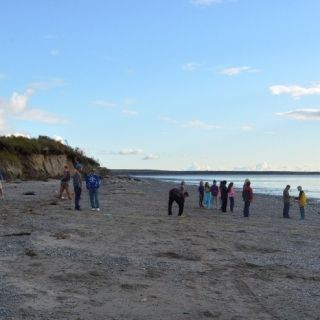
Be a Disciple-Maker
What does discipleship mean to me and what is it to be a disciple-maker in the north? I have to admit that when I hear people talk about discipleship in regards to churches and ministries, I often think of sterilized environments such as church Sunday school rooms and auditoriums. These I think are a far cry from the sandy shores of Galilee and the dusty streets of Jerusalem where the Author of our faith called and trained His disciples.
I grew up the son, nephew, and brother of several great pastors and have spent my share of time in the Sunday school rooms and auditoriums of churches where I received amazing teaching on the Scriptures. But this is not where I was discipled. No, I was discipled outside the church. I had the incredible privilege of being discipled by many different men who were willing to let me tag along as they lived life and demonstrated faith and character.
My father was and is easily the most influential of all of the men who invested in me. As a pastor of a small country church, he had the flexibility to spend a lot of time with me, more than the average dad, but it was how he spent that time that made the difference. I tagged along with him and watched him fix people’s cars, visit people in the hospital, have coffee with people in their homes, listen to endless problems from the broken-hearted, and help anyone who needed it. When it was time for me to get involved in full-time ministry, it wasn't book knowledge that helped the most; it was the example of my dad that impacted me more than anything.
He was discipling more than myself during that time. I remember a time when my best friend and I needed help pulling out a fender on one of our cars. My dad came up with a great idea of using a tree and a chain to help pull on it and the bumper. When the plan worked, my dad exclaimed, “Praise the Lord!” That expression impacted my buddy, who much later gave testimony how my dad influenced him to give God credit immediately in whatever he was doing. My dad was teaching godly character through mechanics.
Since moving to Northern Canada, I have seen how discipleship and disciple-making can be very organic, much like it was in the days of Jesus. Instead of spending time with men on the sandy shores of Galilee, it’s the gravelly beaches and rough waves of Teslin Lake where I enjoy teaching and talking with people. Instead of the dusty streets of Jerusalem, it’s the wood cutting lot where we help people get their winter firewood. I have shared more about Jesus Christ and the Bible with people at the local restaurant over coffee than anywhere else. Northern discipleship requires meeting people where they are at and living out the Christian life alongside them.
One of my favorite discipleship moments from this last year was taking a younger man from our church out moose hunting. He was having a little trouble finding a bull for his family’s winter meat supply, which is a crucial thing to have in the North. I knew where to go and what to do because an older friend had shown me in a previous year when we needed help getting a moose for the freezer. I was able to teach the younger man what to do after he shot the moose, and how to properly care for the 1200lb animal to respectfully harvest all the usable meat. While we worked on butchering the meat, we talked about life and faith and discussed how he could be involved in our church’s ministry. A couple of weeks later, he preached his first message at our church. God is continuing to work in his life, and I am excited to watch him as he disciples others.
Jesus walked along with his disciples and taught them as He went. Jesus was a master at taking common things, such as water, wheat, and even fish to teach Kingdom lessons to those who followed Him. He gives each of us common things every day that are opportunities to teach those around us. Are we willing to take the opportunities He gives us, regardless of where we live, to advance the Kingdom and make disciple makers?
-A SEND North Team member
Additional Posts




